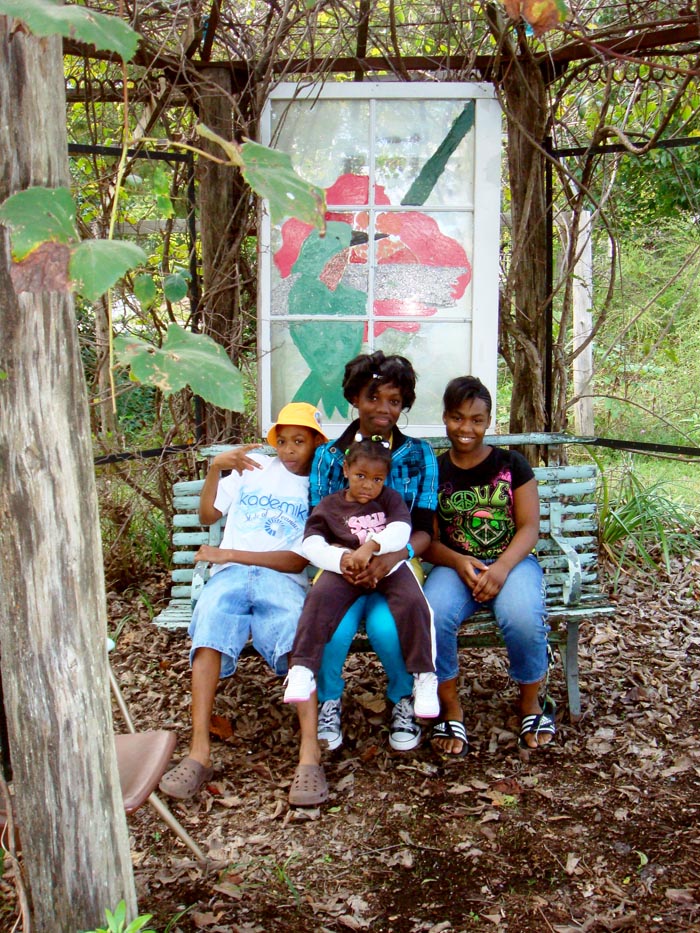By Emily Browder
UNC Staff Writer
the Durham VOICE
On Thursday, Oct. 1, a crowd of approximately 300 people gathered at the American Tobacco Campus in Durham, NC, to celebrate the South Eastern Efforts Developing Sustainable Spaces, Inc.’s 15th anniversary.
SEEDS is a non-profit community garden located in Northeast Central Durham, created by community leader Brenda Brodie and co-founded with Annice Kenan. Brodie had a vision to mold local neighborhoods through gardening. After 15 years, the organization has expanded and blossomed into more than just a plot of land for local gardeners.

From left to right: Daekwon Sims, Nilisha McPhaul, Dakwaneisha Sims and front: Shakyra McKenzie first learned about the SEEDS organization because their families and friends host plots in the community garden. (photo by Emily Browder)
The SEEDS organization was originally developed to work with community members to reclaim unused urban space and turn it into productive, usable land.
“It is a way for people in the inner city to turn a vacant lot into something beautiful and prosperous,” said Lucy Harris, SEEDS executive director. Harris has been on staff at SEEDS for five years and considers herself lucky to be a part of the SEEDS family. “It has been an amazing place to work,” she said.
Over the course of the past 15 years, SEEDS has grown and matured along with its community, by creating new programs targeted at inner city children and youth. In 2000, the Durham Inner-city Gardeners program was created for local teenagers to grow their own produce, herbs and flowers to be sold at the Durham Farmers’ Market, located walking distance from SEEDS on Foster Street.
Santos Flores, the DIG co-coordinator and community garden coordinator, sees an even wider spectrum of accomplishments possible in SEEDS’ future.
“SEEDS is an organization that is expanding the role in food systems,” said Flores, “so far it has made a real big impact on the community. You can tell the people who walk by here have a sense of pride; people respect what is being done here.”
SEEDS has also started an after-school program for low income and inner city children. Harris explains how this program “has had a huge impact helping children from a small age, appreciate eating things they have never heard of before, to really understand what healthy eating is, and why it matters.” This is just the beginning to a food education revolution that SEEDS employees and volunteers hope to see evolve in the future.
With so much involvement and a variety of programs to offer to their Northeast Central Durham community, SEEDS holds several fundraisers over the course of the year to support their cause. Last week they hosted the annual Harvest Dinner in downtown Durham featuring guest speaker, Dr. Charlie Headington.
Headington, a distinguished gardener and professor at UNC-G, also teaches earth matters to young adults. In addition, he conducts permaculture workshops, coordinates and teaches Edible Schoolyards, and speaks and consults throughout the state.
During his presentation at the Harvest dinner, Headington spoke about the food revolution saying, “people want healthy bodies and people want contact with nature, to trust their sources of food and the Farmers’ Market reassures us…people now want to know who we are and where we belong, and gardening teaches us that; and that is the food revolution.”
The sixth annual Harvest Dinner was attended by many distinguished gardeners, local food vendors, and people passionate about SEEDS. Harris states, “the dinner is intended to celebrate and highlight farmers in the area in order to showcase what our local farmers can provide. Every year we have a different chef prepare the meal and encourage people in attendance to buy from local farmers.” All proceeds work to keep SEEDS operating throughout the year.
Flores is hopeful for the future of the SEEDS organization. “We have taken a two acre plot of land that was toxic at one point, and turned it into something that is beautiful. This garden is almost like a sanctuary and is producing food off of it. We hope this can serve as a model for food justice, and to teach people how to make land sustainable.”